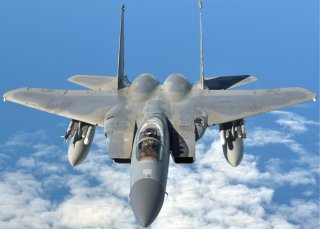Global Strike Eagle: How The F-15 Almost Got Rockets
In 2006, a team from Boeing proposed an incredible new use for America’s legendary F-15 Eagle.
If we take Boeing’s claims at face value, this concept could indeed offer the U.S. Air Force a comparably inexpensive option for launching the very sort of micro and nano-satellites the Space Force is now placing an increased emphasis on rapidly fielding, seemingly making this fighter-based launch system even more promising than it was when first proposed in 2006. But the United States has a number of rocket launch options available to it and no pressing need to invent novel ones that include strapping really big rockets to perfectly good F-15s, at least not yet.
Today, the United States is investing heavily in hypersonic weapons ranging from scramjet-powered cruise missiles to glide-bodies that could indeed be launched from rockets like those proposed for the Global Strike Eagle, but that might actually be a big part of the reason this effort didn’t go any further. The air-launched hypersonic weapons the United States is developing don’t require a 45-foot rocket to be mounted atop the fighter that launches them. It would be cheaper to convert an F-15 into a Global Strike Eagle to deploy these weapons in testing, but in practical application, a weapon that can be mounted under the wing of a bomber just has far more strategic value than one that requires a specially modified and rare launch platform.
But that doesn’t mean this concept doesn’t have some intriguing benefits, especially for the rapid launch of small satellite payloads into low earth orbit. We may never see the Global Strike Eagle manifest as it appears on the pages of these Boeing documents, but there are a number of publicly disclosed efforts to get payloads into space from aircraft, and almost certainly a number of others tucked behind a curtain of classified funding.
So, while the Global Strike Eagle may seem crazy, the impetus behind it and the approach it takes to deploying payloads aren’t really all that crazy at all.
This article was first published by Sandboxx.
Alex Hollings is a writer, dad, and Marine veteran who specializes in foreign policy and defense technology analysis. He holds a master’s degree in Communications from Southern New Hampshire University, as well as a bachelor’s degree in Corporate and Organizational Communications from Framingham State University.
Image: Flickr/U.S. Air Force.

